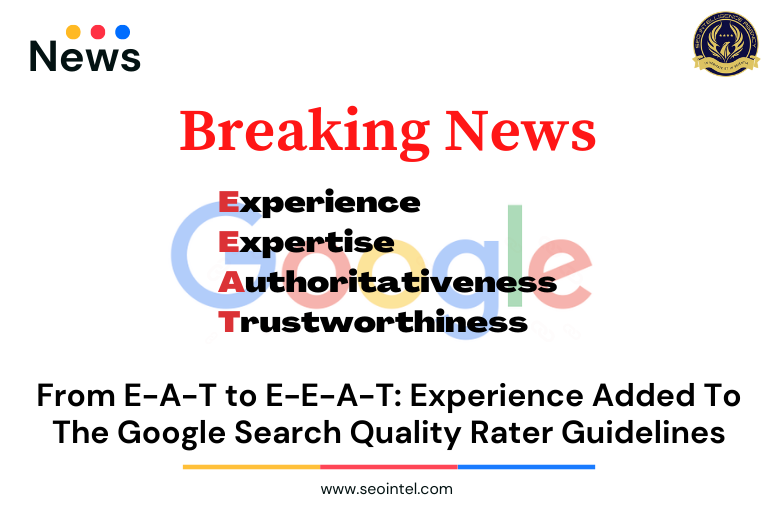
Google’s goal has always been to provide useful and relevant information. There are a lot of ways they ensure this from their ranking system updates, tests, experiments, and through their search quality raters.
Google works with external search quality raters to measure the quality of the search results. These raters assess how well content fulfills a search request, and they evaluate the content using Google’s Search Quality Rater Guidelines. The quality rater guidelines previously evaluated the quality of content through three main benchmarks – E-A-T – E which stands for Expertise, A for Authoritativeness, and T for trustworthiness. Google has recently made significant changes to this, through adding another E – making it E-E-A-T, with the new E, standing for Experience.
E-E-A-T now stands for:
The addition of “Experience” in the guidelines adds another dimension when assessing the quality of content. When it comes to rating for “experience”, Google asks – does the content also demonstrate that it was produced with some degree of experience, such as with actual use of a product, having actually visited a place, or communicating what a person experienced? Google explained that there are some situations where what you value most is content produced by someone who has first-hand, life experience on the topic at hand. This is what they mean when it comes to “Experience”.
In addition to the significant addition of Experience, identifying who operates the website, what type of website the site is, and who is responsible for the content has become important additions to the guidelines.
Researching the reputation of the content creator responsible for the content on the site is also an additional step for the raters. It has become more important to actually learn if the content creator is an authoritative and trustworthy source of information.
Google also places “Trust” as the center of E-E-A-T. According to Google, Trust is the most important member of the E-E-A-T family because untrustworthy pages have low E-E-A-T no matter how Experienced, Expert, or Authoritative they may seem. As an example, a financial scam is untrustworthy, even if the content creator is a highly experienced and expert scammer who is considered the go-to on running scams.

Experience, Expertise, and Authoritativeness are important concepts that can support the assessment for Trust.
The guidelines provide additional examples on what content is considered trustworthy and not, including those under YMYL topics. There are examples for when experience can be considered valuable and trustworthy when it comes to topics in health and finance. Just because the contributor or creator is not a bonafide expert in YMYL, it does not mean that the content is immediately untrustworthy.
Google also provides guidelines on what pages lack E-E-A-T:
● The content creator lacks adequate experience, e.g. a restaurant review written by someone who has never eaten at the restaurant
● The content creator lacks adequate expertise, e.g. an article about how to skydive written by someone with no expertise in the subject
● The website or content creator is not an authoritative or trustworthy source for the topic of the page, e.g. tax form downloads provided on a cooking website.
● The page or website is not trustworthy for its purpose, e.g. a shopping page with minimal customer service information Important: The Low rating should be used if the page lacks appropriate E-E-A-T for its purpose. No other considerations such as positive reputation or the type of website can overcome a lack of E-E-A-T for the topic or purpose of the page.
For a thorough read-through on the updates to the Search Quality Rater Guidelines, check out Lily Ray’s article in Search Engine Land. You could also check out the guidelines directly here.
—
The ratings from the search quality raters are said to not directly impact ranking but they do help Google in benchmarking the quality of their search results and helping them in making improvements to search. Aside from being a guideline to search raters, it is also made available to the general public – for content creators, website owners, developers, etc. in order to provide a better idea of what Google deems to be quality content. If you are in SEO, then it is definitely a resource that you must go through, hand in hand with Google Search Essentials.
With Google focusing more and more on quality content, being able to know what it defines as quality content is very helpful. Creating content with these guidelines and documentation in mind, would not only help your site achieve better rank, but also safeguard it site against any ranking system updates that may happen.